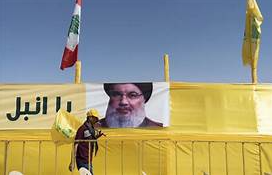The long-time leader of the Iran-backed militia was one of the region’s most significant figures in decades.
As a young boy of ten, future Hezbollah leader Hassan Nasrallah would wrap his grandmother’s long black scarf around his head, mimicking the Shia clerics he saw on television. His father sold fruit and vegetables in a struggling suburb of eastern Beirut, yet Nasrallah – killed on 27 September in Beirut by an Israeli airstrike – felt he was destined for leadership. In a 2006 interview with American journalist Robin Wright, he revealed that even as a child, he would tell his family, “I’m a cleric, you need to pray behind me.”
Nasrallah’s journey to Hezbollah was shaped through years spent in Shia seminaries across Lebanon, Iraq, and Iran. In 1975, at 15, his family fled Beirut amidst Lebanon’s civil war, resettling near Tyre, where a cleric urged him to pursue religious studies in Iraq. There, he met Abbas al-Musawi, Hezbollah’s future leader. The two returned to Lebanon in 1978, expelled from Iraq by Saddam Hussein along with other Shia Muslims. Nasrallah continued his studies under Al-Musawi’s guidance.
After Israel’s 1982 invasion of Lebanon, Nasrallah joined a Shia militant group, which, with Iran’s support and training, would become Hezbollah, the “Party of God.” Nasrallah’s charisma and strategic mindset were evident as he rose through Hezbollah’s ranks, succeeding Al-Musawi as leader after his assassination by Israeli forces in 1992. Under Nasrallah, Hezbollah grew into one of the most formidable militant forces in the region, both politically and militarily, with a complex network of support extending from Lebanon to Syria and Iraq.
However, Nasrallah’s leadership also attracted strong criticism. For many, he became synonymous with Iran’s regional influence, leading Hezbollah to act not solely as a Lebanese entity but as an extension of Tehran’s ambitions in the Middle East. Within Lebanon, many viewed Hezbollah with suspicion, believing it operated more for Iran’s interests than Lebanon’s. Yet, Nasrallah’s influence persisted, with a loyal base of support among Shia communities, portraying him as a protector against Israeli aggression.
His assassination has left a void, sparking intense debate across the region about Hezbollah’s future without its most prominent leader. Analysts and allies alike question whether the organization can maintain its unity and purpose without Nasrallah’s strategic vision. Many speculate that Iran will try to reinforce Hezbollah’s command structure, ensuring continuity despite his absence.
For Hezbollah’s supporters, Nasrallah’s death is a profound loss, mourning a leader who, for decades, symbolized resistance against Israel and defiance of Western powers. Meanwhile, others in the region see his assassination as a potential turning point, hoping it could diminish Hezbollah’s power and Iran’s reach in Lebanon. Only time will reveal the true impact of Nasrallah’s death on Hezbollah and the complex geopolitical dynamics of the Middle East.

